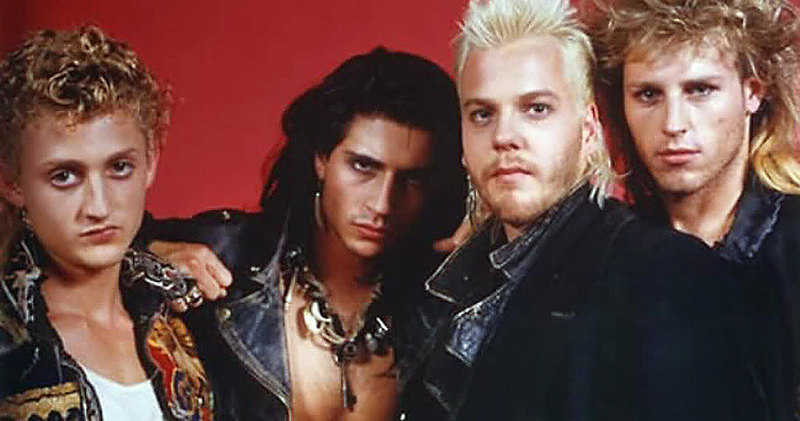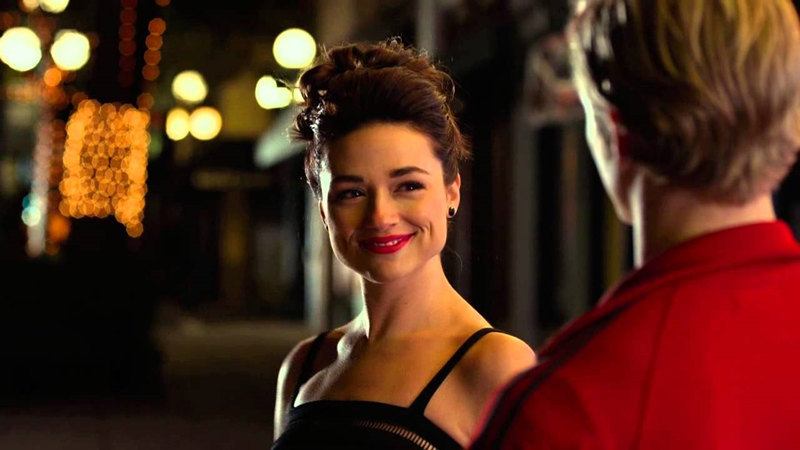In my This Week column I wondered whether it was worth the upgrade to go for the 25th Anniversary Blu-ray of “Spaceballs,” and after watching the movie and the bonus features I’m thinking probably not. Yes, it’s nice seeing Brooks talk irreverently about his equally irreverent film in the one-and-only new bonus feature, “Force Yourself! Spaceballs and the Skroobing of Sci-Fi,” and it’s funny as Rick Moranis in an oversized Darth Vader helmet to hear Brooks quip, after the bonus feature interviewer pronounces it a wrap, something like, “Wait a minute, we haven’t talked about money!” In a film that introduces “Spaceballs” the toilet paper and pokes fun of movie marketing, it’s another Brooks’ gag that zings. But if you already have the Blu-ray + DVD combo, then you have everything that this 25th Anniversary Edition offers with the exception of that under 14-minute one-sided interview with Brooks on camera. If you don’t? Then this 25th Anniversary Edition belongs in your collection.
“Planet Moron”?
Sounds like the title to one of those full-length Three Stooges’ films, but we learn on an interview with Mel Brooks and co-writer Thomas Meehan that “Spaceballs” originally went by that title. And on “Spaceballs: The Documentary” we hear how the actor who played Pizza the Hut was really covered with cheese pizza, wired so that the pizza would bubble. At some point, wouldn’t you know it, the wiring shorted out and the poor guy started smoking!
Those are just a few of the juicy tidbits that Brooks and “Spaceballs” fans will relish on on this Blu-ray that are ported over from previous editions. Brooks remarks that he would have expected his biggest selling films to be “Blazing Saddles” and “Young Frankenstein,” but it turns out that the top consumer favorites are “Robin Hood: Men in Tights” and “Spaceballs.” I can certainly understand the latter. “Spaceballs” is pure silliness—not the clever writing we saw from Brooks in “The Producers,” “Blazing Saddles,” or “Young Frankenstein,” and it doesn’t have nearly as strong of a plot. In fact, it can get kind of muddled at times, if you think too much about it instead of just rolling with the gags. But because the “Star Wars” and “Star Trek” mythologies are such potent forces in our pop culture, Brooks’ scattershot spoof has endeared itself to an entire generation of space-saga junkies.
May the Schwartz be with you!
The real force in the film is, of course, the volatile Brooks himself, a Jewish genius who seems always on the verge of erupting. In the interview with Meehan, a writing partner for many years, Brooks thoroughly dominates, and you get the sense that each of his films, though collaborative, has more of Brooks in it than anyone else. In his commentary (also ported over) he tells how the movie was the result of a collaboration between “two gentiles and a Jew,” and, of course, there are plenty of playful Jewish references in the film, just as there have been in Brooks’ previous outings.
A Druish princess?
Few will remember, but “Spaceballs” came out at a time when Jewish American Princess jokes were all the rage—(How does a Jewish American Princess call her children to dinner? Get in the car!; What’s the favorite wine of a Jewish American Princess? I wanna go to Miami!)—and Brooks had plenty of fun with it himself. The film begins on the day of Princess Vespa’s wedding to the last prince left in the galaxy, Prince Valium, a yawner who has the Prince Valiant haircut but nothing else. Naturally, the princess (Daphne Zuniga) hops in her spacecraft and gets the heck out of there, dragging along her robot attendant, Dot Matrix (voiced by Joan Rivers). Unbeknownst to them (“but knownst to us,” as the “Star Wars”-style scrolling text explains), she is being hunted by Lord Dark Helmet (Rick Moranis), who has been ordered by President Skroob (Brooks) to seize the princess so that Planet Spaceball, which has squandered its atmospheric resources, can hold her hostage until her father, King Roland (Dick Van Patten), gives them the code to penetrate the Druidia air shield and siphon their atmosphere. Got that?
If not, it doesn’t matter, because the gags are the thing, and Brooks and Co. nail enough of them that the parody succeeds—whether it’s the Princess Leia squash-blossom hair that, on Vespa, are really headphones, or Lord Helmet using his ring to zap the genitals of underlings who would cross him. But there are plenty of people who can’t tell a joke, and Brooks’ least successful films are those where the actors couldn’t hold their own against the material. That doesn’t happen here. Even the bland Bill Pullman, who plays Brooks’ version of Han Solo, manages some funny bits as Lone Star, pilot of the fastest Winnebago in the universe, the Eagle 5. And though the “barf” jokes are about as “retched” as they get, Candy, as Barf the Mawg (half man, half dog) is still memorable. It’s when Brooks veers off into cheap-pun land that the gags often don’t work—although when the Spaceballs, told to “comb the desert” for the missing princess and her saviors, grab a gigantic comb and draw it across the sand, Brooks’ cut to an Afro pick saves the sight gag when one of two lone black Spaceballs answer back, with attitude, “I ain’t seen shit!”
Shall I have Snotty beam you up?
“Star Trek” also takes a shellacking, with President Skroob being beamed so that he arrives at the next level with his head on backwards. The Skroob routines aren’t nearly as funny because we’ve seen those shenanigans before when Brooks played the Governor in “Blazing Saddles” and cut up with the cuties he surrounded himself with. And the giant vacuum cleaner that the Spaceballs use to suck up the air (“Suck, suck, suck, suck!”), aside from the recognizable allusion to “Planet of the Apes,” isn’t all that hilarious. In other words, the gags are pretty much hit and miss, but most of the big laughs belong to Rick Moranis, the man inside that gigantic oversized Darth Vader helmet, and to Brooks as Yogurt, the wizened little Yoda-like creature that gives Brooks a chance to play with “Wizard of Oz” allusions as well. In fact, it’s the Dark Helmet and Yogurt gags that most people will remember—not the ending, and not the plot.
Video:
This appears to be the same transfer (AVC/MPEG-4, 32MBPS bit rate) as on previous Blu-rays, with no additional restoration or remastering. It’s presented in 1.85:1 widescreen and has just enough film grain to make it pleasing to look at, rather than annoying. The quality is decent, as you might expect with a Brooks’ film, but as with previous Blu-ray releases you got the feeling that the film could have benefited by an infusion of light in a number of scenes. Still, the level of detail and the edge delineation are strong, and the skin-tones seem natural. It’s a solid video presentation. There’s also a gag option to watch the film at “Ludicrous speed,” which, of course, speeds by in a matter of seconds.
Audio:
As with previous Blu-ray releases, the featured audio is an English DTS-HD MA 5.1 that does its job, whether in ludicrous or any speed. There could have been a little more rumble in the bass, especially with that long opening gag of Dark Helmet’s ship passing across the screen, but the mix is well done. Dialogue is nicely prioritized, but the effects and music backdrop kick in when needed. There are also gag options to hear the film in Mawgese and Dinkese Mono. Additional audio options are Englissh Dolby Digital 2.0 and Spanish and French DTS 5.1 (Portuguese 5.1 Dolby Digital was dropped). Subtitles are in English SDH, Spanish and French.
Extras:
For the 25th Anniversary Edition nobody went out of the way to dig up incredibly great archival stuff. They only added that relatively brief interview with Brooks. The audio commentary by Brooks (with a few comments by the late Graham, who sits in) is identical to previous releases.
Also ported over from previous releases is an interview with Brooks and Meehan, with Meehan apparently given the unenviable (and unnecessary!) task of trying to prod Brooks during their mutual walk down memory lane. But there are no really wonderful insights here, and not much depth. If anything, you sense Meehan’s awkwardness and start to feel sorry for him. There’s also a brief “John Candy: Comic Spirit” tribute that provides an overview of Candy’s career and includes clips and people on camera talking about the late comedian, , six film flubs (not a gag reel, mind you, but mistakes that Brooks made that obviously bug the hell out of him), and a section of quotes that capitalize on the film’s quotable popularity (seven for Dark Helmet, and two each for Yogurt, Barf, Lone Star, Princess Vespa, Dot Matrix, and President Skroob). What’s funny about the quote feature is that there were very few of them that I found memorable, while lines that I recall (Wrong, Lone Star!) didn’t make the cut.
There’s also a storyboard-to-film comparison for one scene (“Take Only What You Need to Survive”), and three galleries that show behind-the-scenes photos, a costume gallery, and an art gallery. What I found most interesting, thought, was the original exhibitor trailer with an introduction by Brooks, and a “Spaceballs: the Documentary” making-of feature that seems to be a cleaned up and expanded version of the “special behind-the-scenes footage” from the first release.
Bottom line:
For all its unevenness, “Spaceballs” succeeds in having fun with its subject. George Wyner, who plays Colonel Sanders, the commander of Dark Helmet’s ship, says that “we laughed more making that film than people laughed watching it.” That joie de vivre, along with the enormous popularity of the space sagas being spoofed, gives “Spaceballs” an energy that sustains it, even 25 years later.


